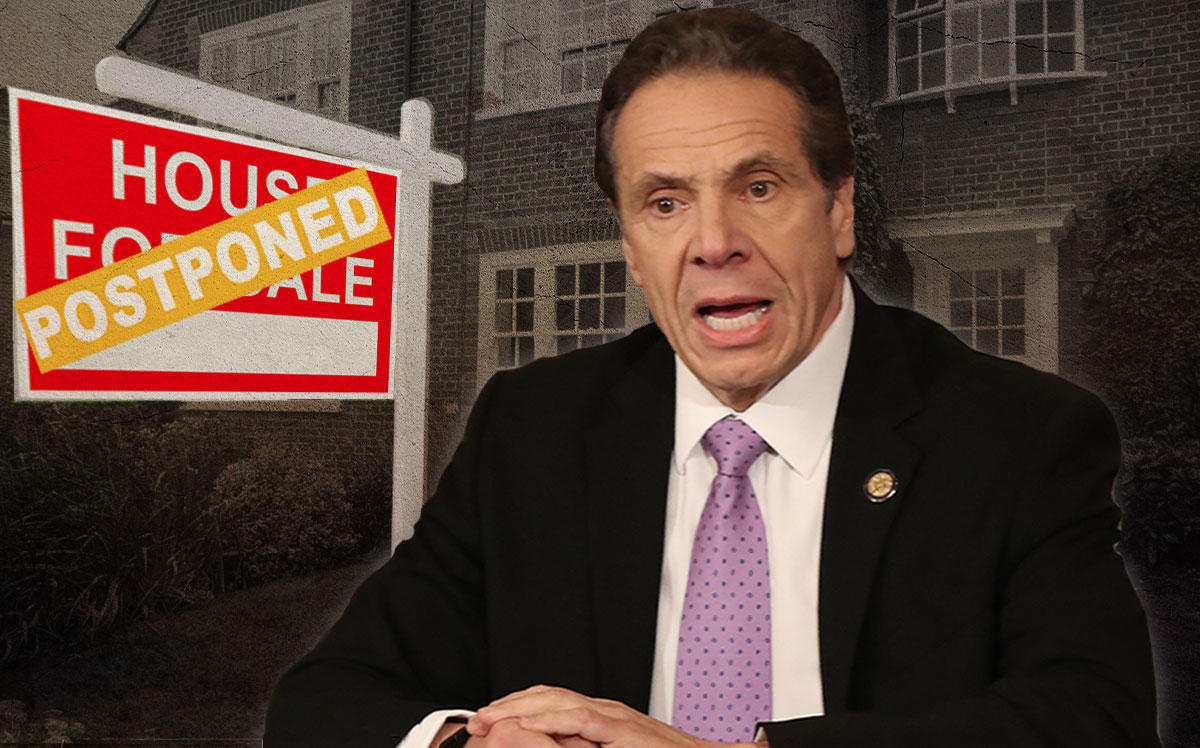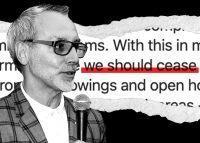 Showing showdown: Resi brokers split on apartment tours amid pandemic
Showing showdown: Resi brokers split on apartment tours amid pandemic
Trending
Cuomo orders real estate agents to stop showing homes
Governor ends industry debate about whether the practice should continue

After a week of debate about whether brokers should continue showing homes, Gov. Andrew Cuomo barred the practice.
The governor’s action Friday — part of a sweeping ban on activities that risk spreading the coronavirus — put some agents at ease but also could temporarily erode their incomes.
Douglas Elliman broker Lauren Muss seemed relieved. “It’s the right thing,” she said.
Earlier in the day she’d conducted what will now be her last showing with “a real-live buyer” for a while. “I was uneasy,” she said. “I didn’t want to get in the elevator with him.”
Muss had been in “self-quarantine” but showing a handful of vacant properties by appointment, with her Purell and gloves at the ready. When asked why she’d met Friday’s customer, she put it simply: “Because he’s definitely going to buy something” — and he was a repeat client.
Now, activities deemed unnecessary by the governor can trigger fines.
At a press conference Friday, Cuomo announced an executive order mandating all employees of non-essential businesses to stay home from work. The list of essential jobs includes food delivery, doormen and some construction. It does not include real estate brokers.
The order requires non-essential businesses reduce its in-person workforce by 75 percent by Saturday, March 21, at 8 p.m. and by 100 percent by 8 p.m. Sunday.
At the press briefing, when Cuomo discussed the 90-day ban on evictions, he said, “I don’t know who you think you’re going to rent an apartment to now, anyway, if you kick someone out. By my mandate, you couldn’t even have your real estate agent out showing the apartment.”
Read more
 Showing showdown: Resi brokers split on apartment tours amid pandemic
Showing showdown: Resi brokers split on apartment tours amid pandemic
 Tension lingers over showings as brokerage chiefs navigate pandemic
Tension lingers over showings as brokerage chiefs navigate pandemic
 "It's a moral obligation": Compass' Leonard Steinberg calls for two-week ban on showings
"It's a moral obligation": Compass' Leonard Steinberg calls for two-week ban on showings
Before the order, Elliman’s Muss was far from the only broker continuing to conduct in-person business.
Ryan Serhant, Nest Seekers International’s celebrity broker, said he and his team continued to show some properties by appointment throughout the week, mostly in connection to closings. Starting last week, he put in place a practice whereby they declined to show the property in-person to anyone who had traveled internationally in the past month.
He said the showings that did occur were optional — and outliers. “I haven’t forced people to show,” he said. “We’re doing as much virtually as we possibly can.”
Serhant also said that he agrees with the closure of non-essential services, including residential real estate brokerage. He pointed to thousands of service industry workers losing their jobs, saying, “If they’re not allowed to go to work, I don’t think we should be able to go to work either.”
Keyan Sanai, an Elliman agent who predominantly does rentals, has also continued meeting clients. He said he’s got five showings scheduled for Saturday and he’s “absolutely” planning to keep the appointments.
“Now is not the time to look for fun,” he said. “They’re in a situation where they need to move.”
He also admitted that there’s a financial incentive, particularly when faced with the uncertainty of how long the pandemic could last.
“Our base salary is still zero dollars so if someone wants to come see an apartment … I’ll be there,” he said. “It’s like dangling that carrot in front of a mule always, [but] especially when you have a totally commision-based job.”
Sanai said he brings gloves, masks and disinfectant to each showing for himself and his clients. He added that he believes Cuomo’s order is for the best and said he’s spent “90 percent of the last week inside” — aside from his showings.
Cuomo’s stay-home order follows a polarizing debate that blew up this week after Compass’ Leonard Steinberg — and the New York Residential Agent Continuum (which Steinberg co-leads) — said there was a “moral obligation” for brokers to discontinue showings. That prompted angry responses from several industry chiefs including Brown Harris Stevens’ CEO, Bess Freedman, who said Steinberg should “stay in his lane.”
“History has already proven Leonard and NYRAC correct in one week,” said Bruce Ehrmann, who leads a team at Elliman. He said he began advising his team to work remotely early last week and has not done a showing since March 12.
He said he decided to stop based on reports from his relatives in China and France. “There was pressure to show on [March 13],” he said. “When you’re representing a development, a lot is at stake … There is a sense of duty … [but] that sense of duty needs to be correlated to an international health emergency.”
The Real Estate Board of New York said in a statement, “All New Yorkers must follow today’s order from Governor Cuomo, and that includes no real estate showings. This crisis changes by the hour and today we are in a very different place compared to where we were a few days ago.”
In an email to members late Friday, the board advised agents to use technology to facilitate closings, warning that halting sales and leasing activity at this time could “create considerable hardship for owners, buyers and tenants.”
Many New York City brokerages began working remotely a week ago, although some, including Warburg Realty’s Tania Isacoff Friedland, say their business had “started to taper off” by then.
Jordan Sachs, CEO of Bold New York, said his firm shut down its on-site teams on Friday — one of several brokerages to do so. “We are not characterized as essential personnel and we’re not, quite frankly,” Sachs said. “Safety and health is vital — not just for our agents, but to the buildings and places we work.”
He said agents were taking the news in stride. “They’re around people all day. They don’t want to help advance the illness or become sick,” he said. “It’s a global issue.”
Among brokerage heads, the governor’s words left little doubt that agents are not essential.
“He called us out in particular, it was unambiguous,” said Mark Chin, head of Keller Williams New York City. “We don’t have to try to decide if real estate agents should show apartments anymore. It’s over.”
But he does not intend to follow to the letter Cuomo’s order that 100 percent of non-essential employees cannot go to their workplace.
Chin said many of his agents have left the city, but he still plans to go to the office to cut checks for pending deals or deals that recently closed. “Even if nobody comes in, my CFO and I will be there to process the checks. I’ll put up with the consequences. I’d argue there’s nothing more essential.”
Eddie Shapiro, CEO of Nest Seekers, said the industry has been preparing for all-digital transactions for decades. Nest Seekers has had engineers working around the clock to ramp up tools and offerings. “All transactions can be processed through our online platforms,” he said.
“Does it make it harder? Yes. Will it be impossible? I think we can adjust and continue to try and operate and I think we will,” he said. “I’m more concerned about buyers and sellers’ mental state. Are they freaking out? Backing out of deals?”
BHS’ Freedman said there’s no doubt business will slow down. In the immediate future, she said, “people are scrambling because closings are set, but no one can move in or out.” BHS is advising buyers to close and, if possible, rent back the unit to the seller.
BHS’ offices were closed as of Monday, and the firm sent a memo to agents Friday informing them of Cuomo’s order to stay home.
“We’re saying, No showings,” Freedman said. “No, Leonard, I still wouldn’t say it’s a moral obligation. Now it’s mandated. Everyone has an obligation legally to hold off.”
Steinberg called Cuomo’s Friday order a “reflection” of his and NYRAC’s position that was “truly in the best interest of everyone.”
“We were not preaching. We were not mandating,” said Steinberg. “This was truly to help agents and give them guidance and leadership … We have a responsibility to our communities.” He added that NYRAC is working on a system to offer financial support to agents.
The governor’s executive order is yet to be released in full, and questions remain about what it means,and how it will be enforced. Real estate lawyers across the city are busy trying to navigate the latest order and several other new rules that have piled up this week as the state shuts down businesses, gatherings and evictions.
Stuart Saft, a partner at Holland & Knight LLP, said the order was more than simply guidance because, theoretically, violating it could be considered a Class B misdemeanor. “It is the functional equivalent of law for that limited period of time,” he said.
In California, Gov. Gavin Newsom suggested Thursday that a statewide limited stay-at-home order in the state will be enforced more through social accountability than heavy-handed controls.
“There’s a social contract here, people I think recognize the need to do more … They will begin to adjust and adapt as they have been, quite significantly,” he said. “We will have social pressure and that will encourage people to do the right thing.”
Write to Sylvia Varnham O’Regan at so@therealdeal.com; E.B. Solomont at eb@therealdeal.com; and Erin Hudson at ekh@therealdeal.com




